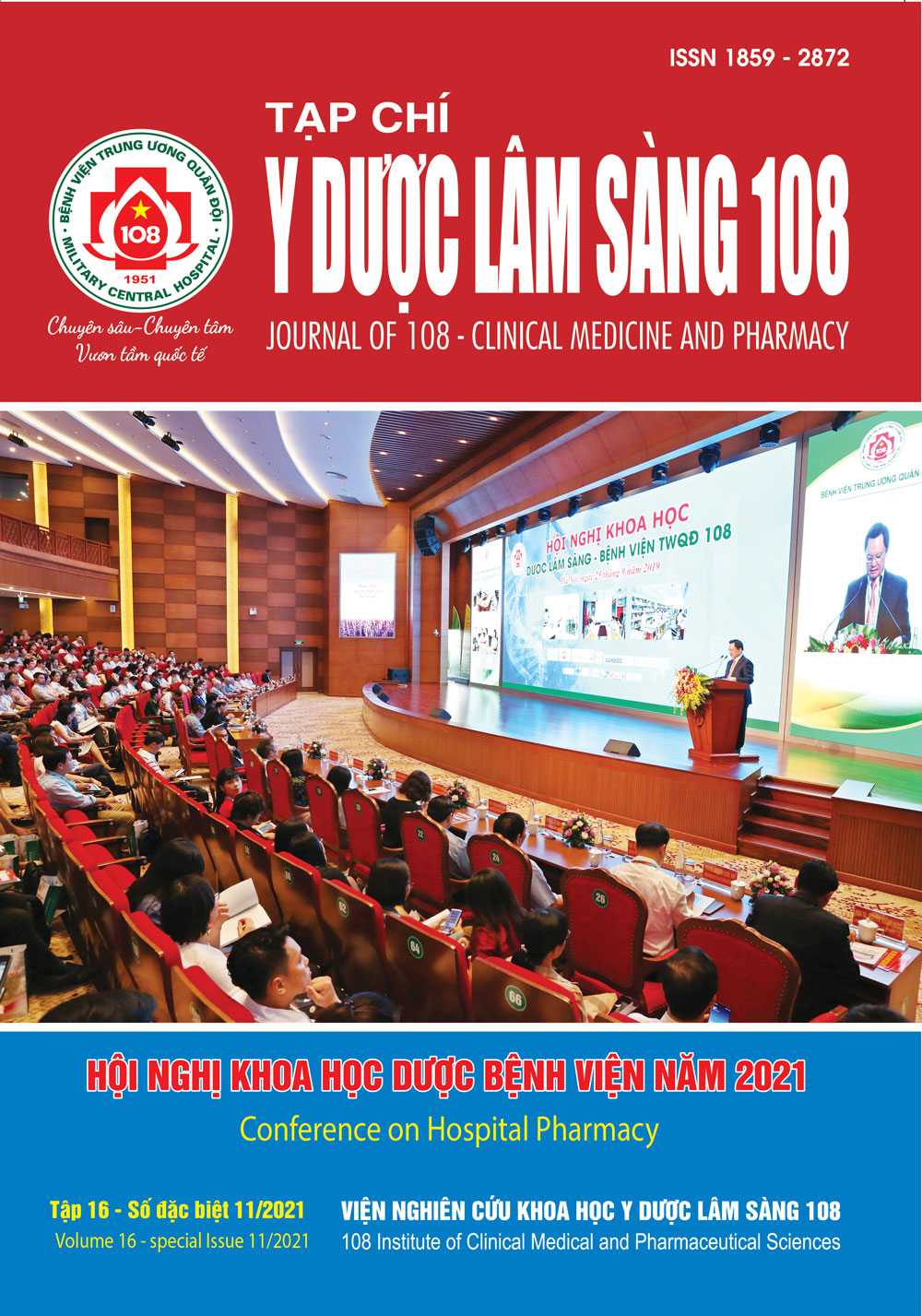Evaluating the appropriate use of PPIs for stress ulcer prophylaxis in critically ill patients at 108 Military Central Hospital
Main Article Content
Keywords
Abstract
Objective: To evaluate the appropriate use of proton pump inhibitors (PPIs) for stress ulcer prophylaxis in critically ill patients at 108 Military Central Hospital. Subject and method: A cross-sectional, retrospective description study was conducted based on electronic medical records of patients prescribed PPIs at the Department of Respiratory Infectious Diseases and Resuscitation, the Cardiovascular Resuscitation Department and the Intensive Care Center from 01/01/2021 to 30/04/2021. Result and conclusion: The proportion of patients with rational initial prescription of PPIs for stress ulcer prophylaxis was 60.0%. The proportion of patients with rational prescription of PPIs when evaluating throughout the intensive care period was 84.7%. PPIs dosing regimen was appropriate in 95.1% of patients. Cooperation between clinical pharmacists and physicians needs to be enhanced in order to optimize the clinical practice of stress ulcer prophylaxis in critically ill patients.
Article Details
References
2. Alsultan MS, Mayet, AY, Malhani AA, Alshaikh MK (2010) Pattern of intravenous proton pump inhibitors use in ICU and Non-ICU setting: A prospective observational study. Saudi journal of gastroenterology: official journal of the Saudi Gastroenterology Association 16(4): 275–279. https://doi.org/10.4103/1319-3767.70614
3. Barletta JF, Kanji S, MacLaren R, Lat I, Erstad BL, American - Canadian consortium for Intensive care drug utilization (ACID) Investigators (2014) Pharmacoepidemiology of stress ulcer prophylaxis in the United States and Canada. Journal of critical care 29(6): 955-960. https://doi.org/ 10.1016/j.jcrc.2014.06.025.
4. Farrell, Christopher & Mercogliano, Giancarlo & Kuntz, Catherine. (2009) Overuse of stress ulcer prophylaxis in the critical care setting and beyond. Journal of critical care 25: 214-220. 10.1016/j.jcrc.2009.05.014.
5. Gerald L Weinhouse, MD (2020) Stress ulcers in the intensive care unit: Diagnosis, management, and prevention. www.uptodate.com
6. Nghiem Thi Thuy Linh (2015) La prophylaxie d’ulcère de stress par les inhibituers de la pombe à protons: Étude de bon usage à l’hôpital Thanh Nhan, Hanoi. http://canhgiacduoc.org.vn/.
7. Rhodes A, Evans LE, Alhazzani W, Levy MM, Antonelli M, Ferrer R, Kumar A, Sevransky JE, Sprung CL, Nunnally ME, Rochwerg B, Rubenfeld GD, Angus DC, Annane D, Beale RJ, Bellinghan GJ, Bernard GR, Chiche JD, Coopersmith C, De Backer DP, Dellinger RP (2017) Surviving sepsis campaign: international guidelines for management of sepsis and septic shock: 2016. Intensive care medicine 43(3): 304-377. https://doi.org/10.1007/s00134-017-4683-6.
8. Toews I, George AT, Peter JV, Kirubakaran R, Fontes L, Ezekiel J, Meerpohl JJ (2018) Interventions for preventing upper gastrointestinal bleeding in people admitted to intensive care units. The Cochrane database of systematic reviews, 6(6), CD008687. https://doi.org/10.1002/ 14651858.CD008687.pub2
9. Ye Z, Reintam Blaser A, Lytvyn L, Wang Y, Guyatt GH, Mikita JS, Roberts J, Agoritsas T, Bertschy S, Boroli F, Camsooksai J, Du B, Heen AF, Lu J, Mella JM, Vandvik PO, Wise R, Zheng Y, Liu L, Siemieniuk R (2020) Gastrointestinal bleeding prophylaxis for critically ill patients: A clinical practice guideline. BMJ (Clinical research ed.) 368: l6722. https://doi.org /10.1136/bmj.l6722.
 ISSN: 1859 - 2872
ISSN: 1859 - 2872
